A Letter to My White Ignatian Family
BY KRISTEN TRUDO | February 8, 2016
Editor’s Note: Today’s reflection is written by Kristen Trudo, a 15-16 Jesuit Volunteer, and was inspired by her recent experiences working in St. Louis, Missouri. Read her previous reflection about her JV experience here.
Dear You,
Writing about race scares me. I’m intimidated by the misconception that my words represent the experience of an entire race of people. I know they don’t. But I also know that some people will assume that they do. You are white. So perhaps this does not resonate with you. I believe that one must write anyways, though. And my objective is simple: I once heard that “justice is the minimum of love.” So I suppose I am challenging you, as a person of the Ignatian family, to not speak of love until you can first work for justice.
I’m a 23-year-old woman who identifies as black, working as a Jesuit Volunteer in St. Louis. But I’ve never thought much about race. Until now. Until JVC. Until I found myself in white spaces that I didn’t expect to be white.
But perhaps before speaking about these white spaces, it’s vital to tell you about the ones that have shaped me: I grew up in the suburbs an hour east of Los Angeles. I did not have a teacher who identified as a person of color until high school. I was a parishioner at an upper-middle class Catholic church with upper-middle class white people. Almost all of my best friends were white. I have grown accustomed to white spaces. To being black in white spaces. I’m not much of a dancer, but I’ve learned to move within these spaces with such fluidity that, sometimes, I think even I forgot I was black. I am a young black woman who never learned what it meant to be black. Rather, I learned what it meant to not be white–and now realize that every space, conceptually, was built around my relationship to whiteness.
Perhaps it changed with Trayvon Martin, when I was studying abroad in Oxford and could not bring myself to leave my dorm because of the weight of that acquittal. The weight of a hoodie. The weight of my blackness. Or maybe it was Mike Brown. The non-indictment. Sitting on my parents’ couch, processing the message: It was okay for a police officer to murder a child. As long as he was black. And I felt that weight, that paralysis, all over again. I felt my black body.
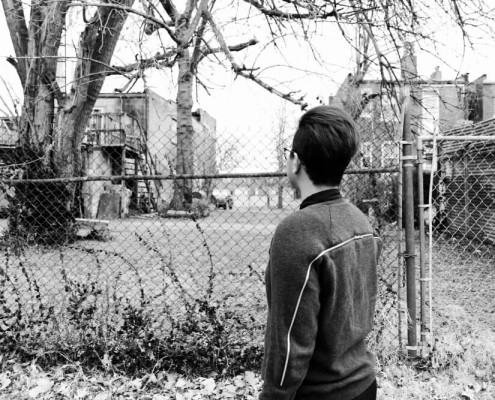 A month later, I applied to JVC. And in its talk of social justice, I expected to find people who looked like me. To enter spaces that were different, uncomfortable, and would challenge me to think about race. My race. And then they weren’t. I was in the same white spaces. With white JVC staff and white Jesuit Volunteers and white coworkers at my placement. I realized that my challenge would not be navigating spaces of color while beginning to understand my blackness, but instead, to dance amidst these white spaces in a different way. My challenge was to wake up, even before I fully understood my space in the world as a black woman.
A month later, I applied to JVC. And in its talk of social justice, I expected to find people who looked like me. To enter spaces that were different, uncomfortable, and would challenge me to think about race. My race. And then they weren’t. I was in the same white spaces. With white JVC staff and white Jesuit Volunteers and white coworkers at my placement. I realized that my challenge would not be navigating spaces of color while beginning to understand my blackness, but instead, to dance amidst these white spaces in a different way. My challenge was to wake up, even before I fully understood my space in the world as a black woman.
I’ve found that in these spaces, I have been looked upon as a voice for the black community–even as I continue to struggle to be worthy of such. I am black. But I am not yet the black woman I want to be. Still, I’ve been asked: What do you need from us? What can we do?
I’ve answered the questions because, so often, it feels like my job – even though I’ve been reminded this year that it is not. As author Ta-Nehisi Coates writes in Between The World And Me, “We are captured. . . . and the terrible truth is we cannot will ourselves to an escape on our own.” The ultimate hope of our movement rests with those who perpetuate the legacy of our captors–intentionally or otherwise. It rests on the stirring of white people. Though I recognize that changing you is not my responsibility, I also recognize the resonance of the black voice. Martin’s. Ta-Nehisi’s. And perhaps even my own. It is not my job to speak. But, perhaps if I speak to you and you listen – there will one day be a generation of black children who don’t have to.
I’ve met white people in St. Louis who are far more adept at discussing racial justice than I am. Those same people are in your midst. I challenge you to find them. Ask them where they started. Move. Walk. March. Read a book. Watch a documentary. Have a difficult conversation. Ask where you stand in the destruction of people who look like me. Choose to risk your body–in the way the man you follow sacrificed his own. Our black bodies are at risk for simply existing. We have no choice. But you do. And in your choice, there is power.
One day you’ll find yourself in the fire of discomfort with a person of color. You’ll have made a mistake. Said something stupid. Insensitive. Ignorant. And you’ll want to run from the fire. Perhaps to extinguish it with “I’m sorry,” or “That’s not what I meant.” But I’m going to ask you to sit there. Inhale the discomfort. Allow her to tell you why what you did or said was painful, devastating, traumatic. Do not try to extinguish her voice.
Because that is the only way you will learn: By letting the fire swallow your ignorance and fear and complacence. And, in that, you’ll discover that this work burns. Perpetually.
But you’ve asked the questions. And I hope you’ll choose to burn until you find your answers.
In the questions and the fire,
Kristen

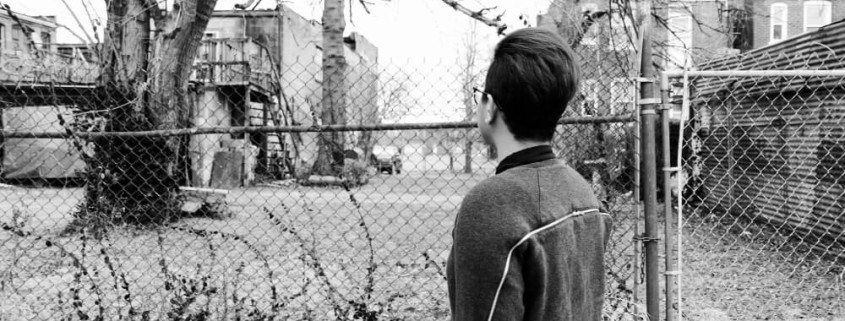
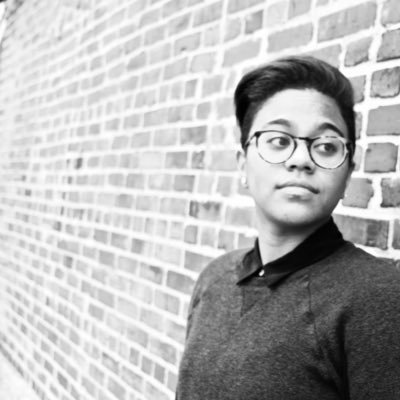
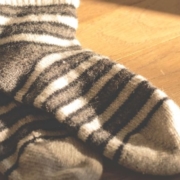
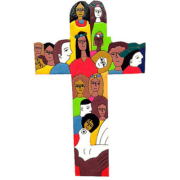

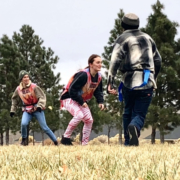
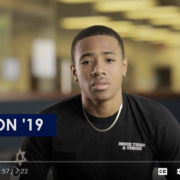
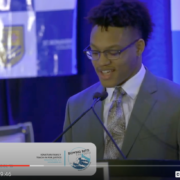


Kristen,
Thank you for your heartfelt and thoughtful reflection.
I have read Ta-Nehisi Coates’ two books and am rereading them to try to understand.
I am a white male, 68 years old, have worked as a Catholic priest for 26 years with Spanish-speaking communities, as well as with smaller numbers of Vietnamese and African-Americans.
You are right to ask white people to listen. We can learn a lot by listening.
Thanks again for sharing your experience and your perceptions.
Peace,
Fr. Kenneth Hallahan
Dear Kristen,
Thank you for the risk of sharing what is difficult to share and what can be so easily misunderstood.
Kristen,
Thank you for having the courage to speak and to challenge us. These times are so rife with extreme behavior and language and if we cannot talk about it and have honest dialogue, we will not find a better way. Justice is for all. My experience with JVC was similar to yours. Although I am a white female, I felt uncomfortable that most of us were white middle class people working in poor areas with mostly people of color. There was not enough discussion of race at our JVC retreats (this was almost 15 years ago). Although times seem difficult right now, I am heartened that at least people are beginning to see that there is a deeper problem that is still not fixed and that being “color blind” does not work. Please keep speaking up. I promise to keep listening and speaking up too.
Fran
Thank you, Kristen, for saying what is so very important. I grew up in Southern California (Arcadia) and work as a Child and Adolescent Psychiatrist in a community clinic in New Haven, CT. Our patients and colleagues are a pretty rich mix of races and ethnicities. That is a blessing in many ways, certainly including the challenge to listen deeply. Related to that, I am increasingly aware of not “ministering to” our patients but rather, and certainly in an Ignatian sense, the mutuality of the encounter. Thanks again for your courage and wisdom.
Pam
Kristen,
Your words reflect the knowledge, understandings I received from the education I as a white, Catholic student at the Black Catholic Institue in the 1980’s. Thank you for taking your place as a conscious person encouraging those of us who are white to keep learning.
Blessings, Nancy CorcorN, CSJ
Thank you so much for speaking. My JVC experience was decades ago (’78-’79). While I’m grateful for the social justice education I received that year, I have yet to fully process the alienation I felt as the only black volunteer in JVC: East. Your letter leads me to believe there is still much work to be done within the organization. I believe the desire is there, but it has to be matched with proactive intention.
“Because that is the only way you will learn: By letting the fire swallow your ignorance and fear and complacence. And, in that, you’ll discover that this work burns. Perpetually.
But you’ve asked the questions. And I hope you’ll choose to burn until you find your answers.”
Beautiful. Thank you for your words.